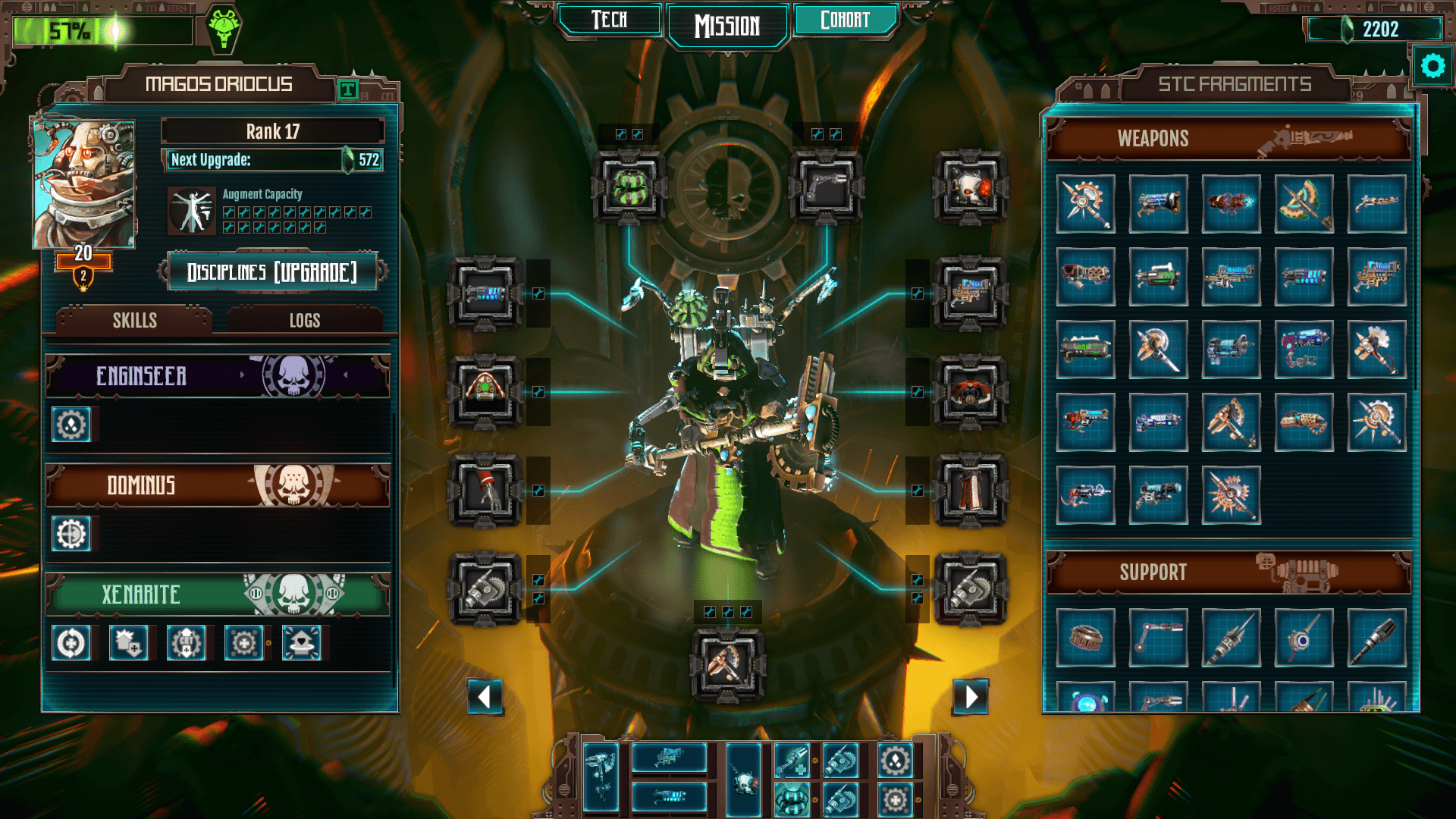Overview
In the grim darkness of the far future there is only fantastic gameplay. In Warhammer 40,000: Mechanicus your objective is to purge the Necron presence on planet Silva Tenebris. You play as Magos Dominus Faustinius, leader of an Adeptus Mechanicus ship and the troops on it.
The game is played in a succession of missions. Each mission has different enemies and rewards, so the player can choose what to prioritize. But it’s important to finish each mission fast, because there’s a global timer and with its every tick, the Necron overlord Szaregon comes closer to awakening.
Story
Warhammer 40,000: Mechanicus, which I will be referring to as Mechanicus, is a game without much of a story. What there is, however, is perfectly sufficient. The planet Silva Tenebris was newly rediscovered and the arrival of an Adeptus Mechanicus ship triggered the awakening of Szaregon, one of Necron overlords. The entire planet is actually full of Necrons, but they’ll only awaken when their master does – making the task of destroying Szaregon even more important.
Although there isn’t much of an overarching story beyond that, the game does feature dialogue and a narrative for each mission. There is lore for each ally, every member of the Szaregon cohort, and all weapons, but there isn’t much tying the missions together or connecting them to the main plot. There is a big baddie – he has his lackeys – and you much defeat each one of them before going after him. Not much of an original narrative, but a fun one nonetheless.
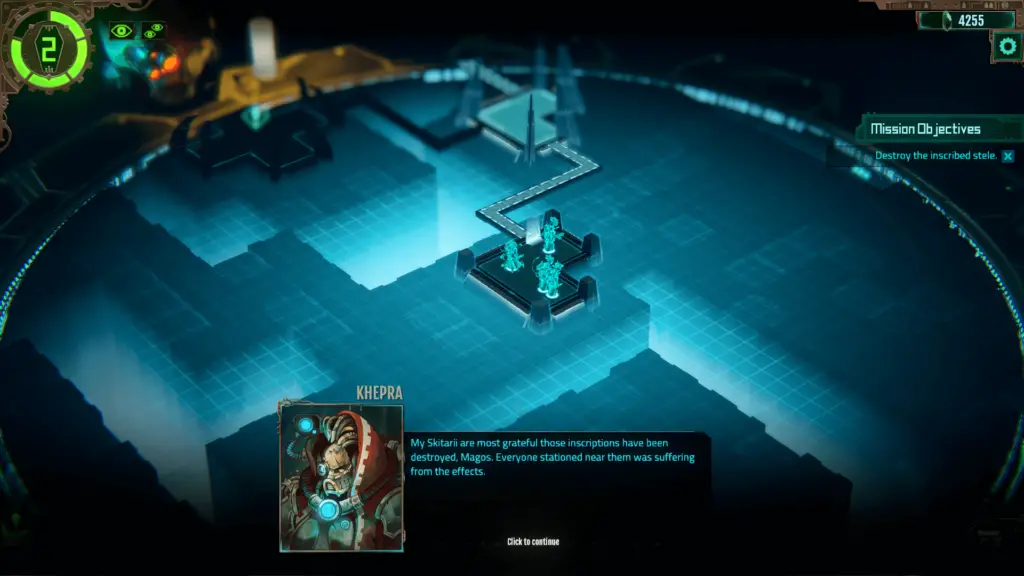
Not like that is a problem. It’s interesting to see characters talking amongst themselves, giving insight into their motivations and morals. Scaevola is willing to be a little heretical for some tech, Videx wants to destroy all xeno artifacts, and so on. A nice dynamic between the supporting cast makes this game way more engaging. In conclusion, an enjoyable story, even if a background one at times.
Gameplay
Mechanicus is still a heavily combat-focused game, even if interspersed with some narrative events and team building. Battles are thematic and fun, with an assortment of mechanics that feel at home with the universe. For example: There is a resurrection mechanic, for most enemies, prevented by double-tapping their bodies; You can’t see enemy unit statistics by default, so you need to use specific weapons and skills to get that information; Every tech-priest (your heroes) has a servitor that can be used to reveal info, deal damage and even buff allies – And the list goes on. All in all, there’s an array of unique and immersive gameplay ideas to be found here.
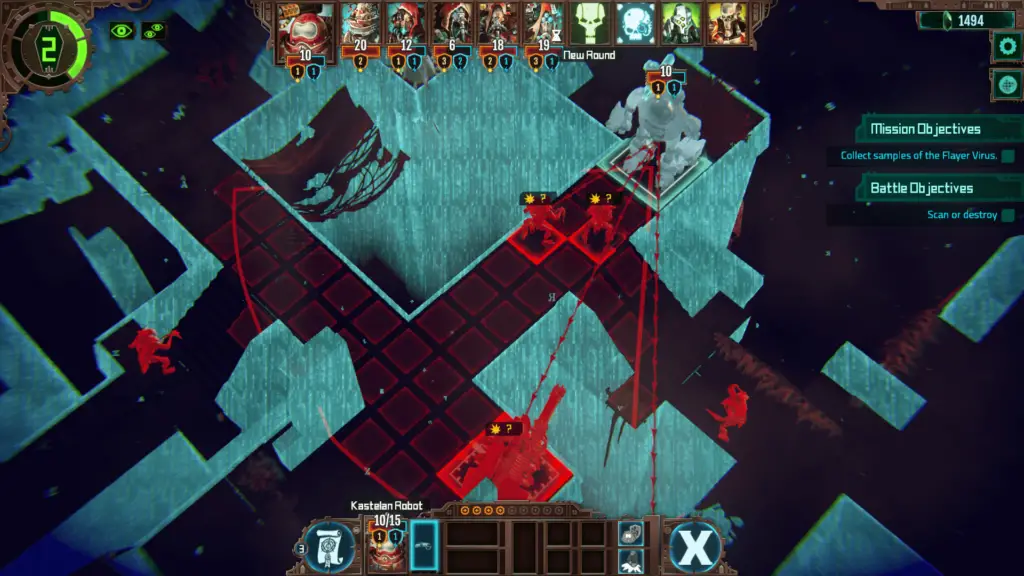
The gameplay loop isn’t that complicated: Customize your units, choose your mission, fight a few battles, select answers during narrative events. Rinse, repeat. The customization and the combat are fine. Concerning the former – there are a bunch of options, and it does feel rewarding to try new things. As for the latter – there is a great variety of enemies and the mechanics are fun and intuitive. However, with the narrative events, I do have a pet peeve. They feel too random. Maybe as a hardcore 40k fan, you’d know all the right answers. For me, though, it was just too difficult to guess on what the best course of action is supposed to be. It just felt like I was getting debuffs for no reason. Well, at least the game has the option to turn this off.
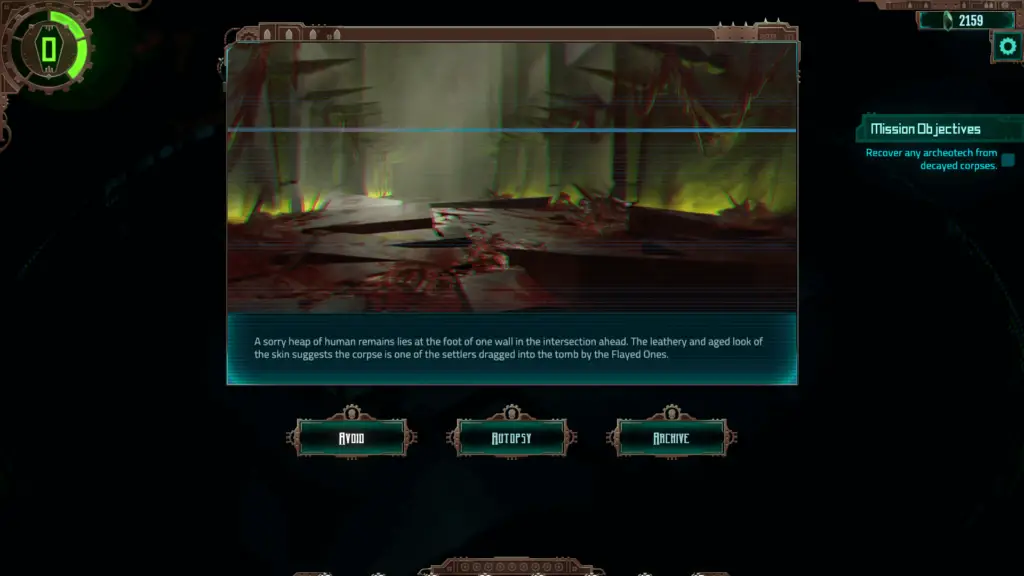
Difficulty
This game has problems with its difficulty scaling. It starts out challenging, but quickly becomes easy with just some weapon and skill unlocks. There are a few different options for adjusting difficulty, and they can certainly resolve some issues. This, however, isn’t likely to fix the problem for those who aren’t especially familiar with the gameplay. As such, the game could really benefit from having better balancing by default.
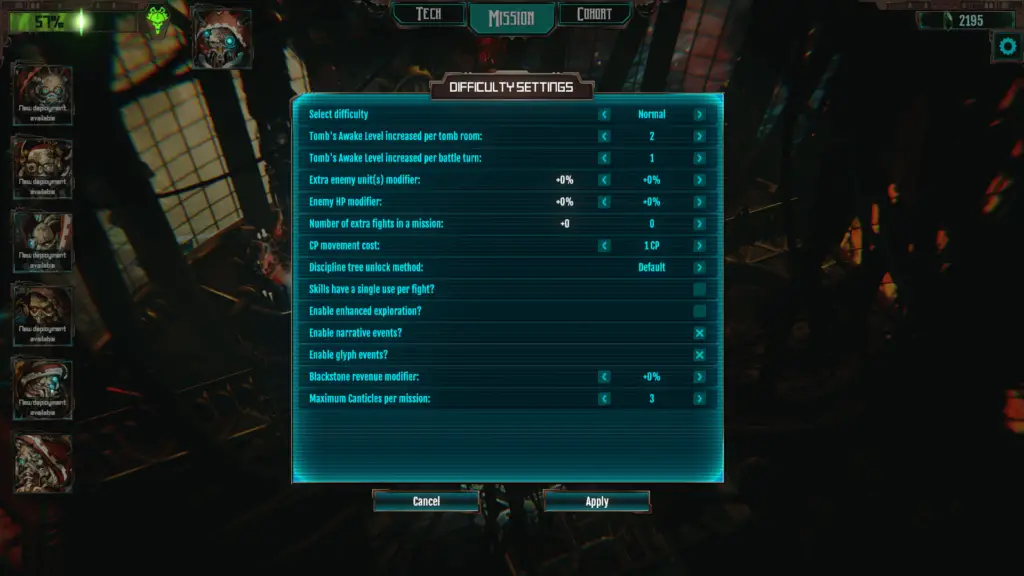
Visuals
This game is fantastic in this regard. Everything is crisp, detailed and overflowing with personality. The visuals are quite good, without burning your GPU, and the animations are truly immersive. Every unit looks distinct, with its own color and size, which really helps with target identification. Each map feels special, from the gritty tombs of Ubjao to the mysterious corridors of Neftusk.
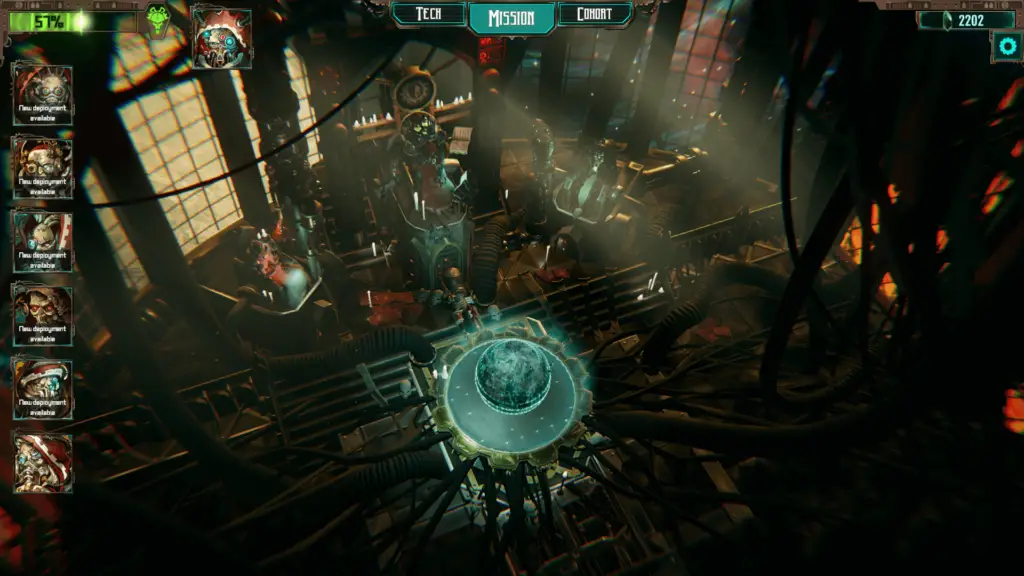
Each piece of gear is displayed on your tech-priest’s model. This makes it really rewarding to see your units all like Doctor Octopus obliterating Necrons throughout the halls. The enemy units also look quite detailed, although their designs are a bit repetitive. Every Necron Immortal is the same. It does fit in with the theme that they’re all robots made from the same blueprint. However, it really contrasts with the player’s unique-looking units. At least there are plenty of differences between the various unit types, and they are all faithful to the original Warhammer 40k designs.
Soundtrack
This soundtrack is incredible. The music is fantastic – it is very thematic and makes each battle feel that much more epic. The sound effects are precise, unique and quite good to hear. Each weapon type also has its own sound profile. This makes it possible to identify weapons by sound alone – with some hours of gameplay under your belt.
Even those details like the noosphere vision and the character voices are incredible. It really feels like the developers didn’t cut any corners with respect to sound design. From the music to the sound effects – everything is perfect. If I must point out an issue, however – the soundtrack does become a bit repetitive after a while. Although that’s more of a problem with the game’s duration, than with its music.
Replay value
Mechanicus isn’t a game with much of a replay value. It’s fun to play through, but by the end it really feels like you’ve experienced everything it can offer. After spending so much time unlocking interesting skills and weapons – it isn’t a fun prospect to have to do it all over again. Loading an old savefile to run some missions or experimenting with the difficulty options is fine. However, I really don’t see anyone, short of enraptured by this game, replaying it from start to end. There just aren’t too many new features introduces throughout its course, aside from some gameplay mechanics or weapons to try.
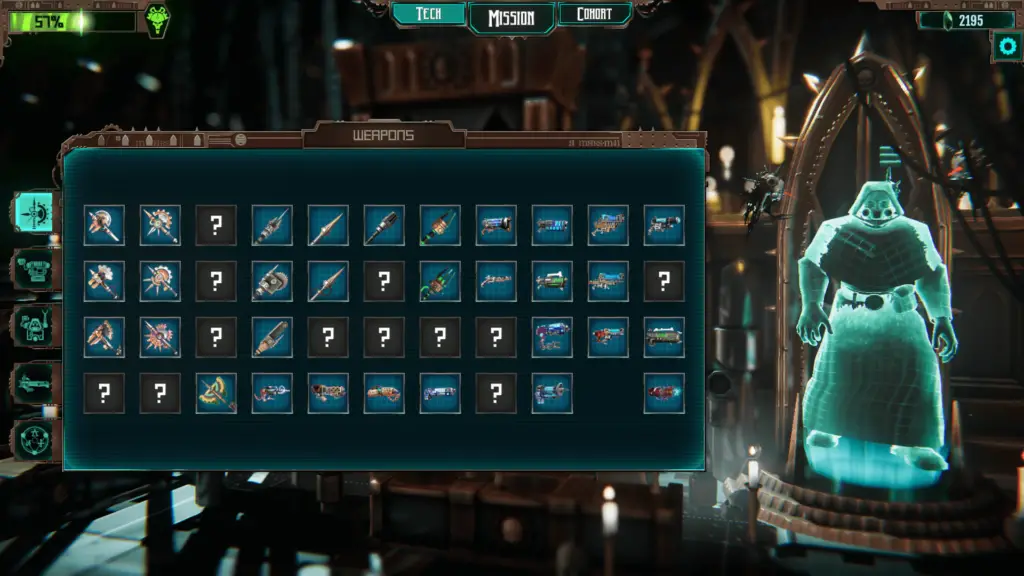
DLC
Mechanicus has one DLC called Heretek. It adds weapons, missions, and a new character class – or discipline as these are called, to the game. Everything takes place on the main ship, facing the enemy that hides among Adeptus Mechanicus. The new missions offer a unique spin on the gameplay, with some options letting you choose in advance on how best to approach the situation. They also don’t count for the Necron Awakening clock. This allows you to take your time and makes for a more relaxed gameplay.
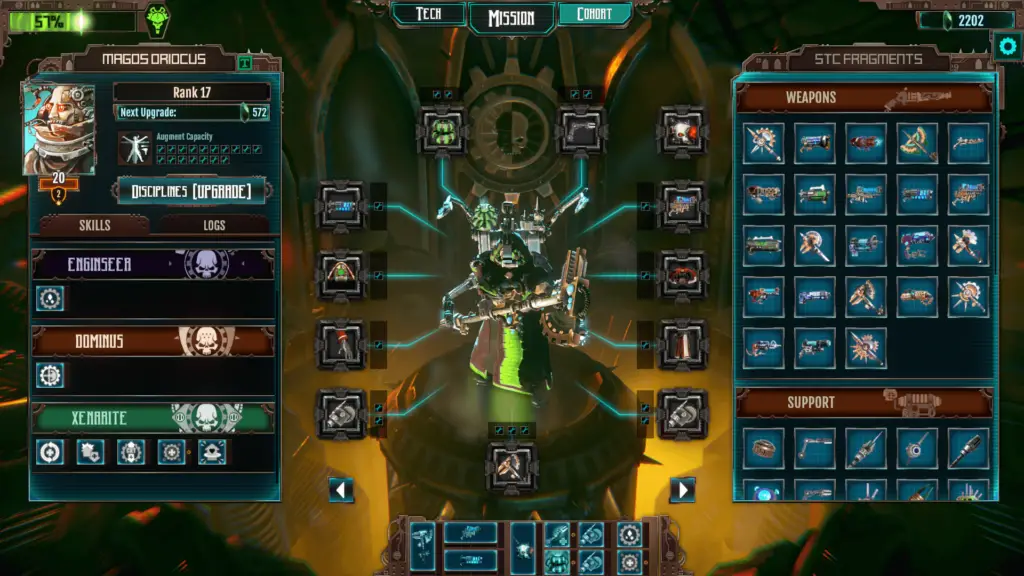
The additional weapons are effective, although they don’t really offer anything new in terms of effects. In a way, they do feel just like the weapons that are already in the game – but green. However, the new discipline – Xenarite, feels refreshing and offers a unique way to play the game. It gives your troops access to a tanky archetype with some cool abilities that trade life for damage.
Even if it’s a cool addition to the game, this DLC is still overpriced. It doesn’t give you enough content to justify being priced at a third of the base game. Get it on sale.
Conclusion
Mechanicus is a well-polished turn-based combat game with some interesting mechanics, incredible graphics and an amazing soundtrack. Holding it from becoming a masterpiece are some design details like the poor difficulty scaling or the frustrating choice options between battles. Maybe a random map skirmish mode, additional challenges, or even multiplayer can make this game hotter. In the end, however, it’s a fun and pleasant game to play – and a must for Warhammer 40k fans.

